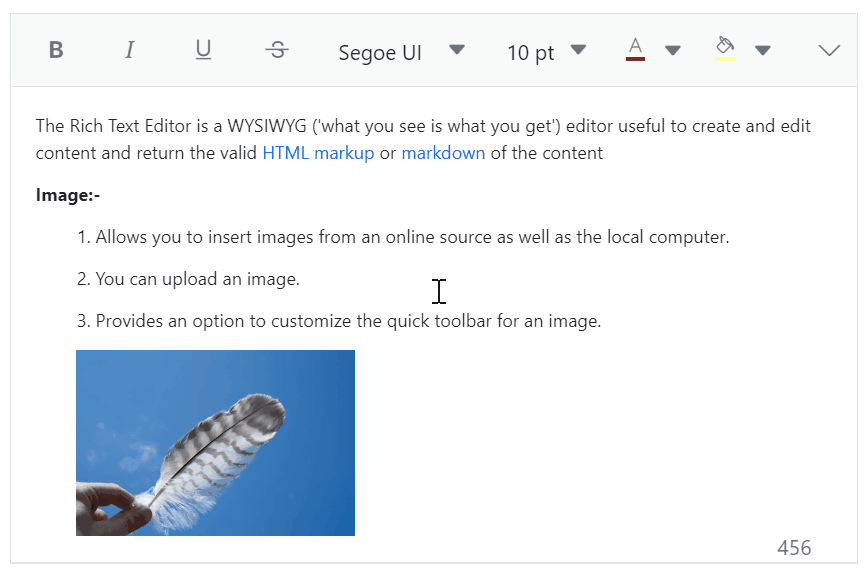
Security News
pnpm 10.0.0 Blocks Lifecycle Scripts by Default
pnpm 10 blocks lifecycle scripts by default to improve security, addressing supply chain attack risks but sparking debate over compatibility and workflow changes.
@syncfusion/ej2-vue-richtexteditor
Advanced tools
The Vue Rich Text Editor component is a feature-rich WYSIWYG HTML editor and WYSIWYG Markdown editor. The Rich Text Editor is widely used to create blogs, forum posts, notes sections, comment sections, messaging applications, and more. The control provides an efficient user interface for a better editing experience with mobile support. It has a variety of tools to edit and format rich content, and it return a valid HTML markup or Markdown (MD) content. It allows users to insert images, links, tables, media files and lists with modular architectures.
Getting started . Online demos . Learn more

Trusted by the world's leading companies

You can use Vue CLI to setup your Vue 2 applications.To install Vue CLI use the following commands.
npm install -g @vue/cli
vue create quickstart
cd quickstart
npm run serve
Initiating a new project prompts us to choose the type of project to be used for the current application. Select the option Default ([Vue 2] babel, eslint) from the menu.
All Syncfusion® Vue packages are published in npmjs.com registry. To install Vue Rich Text Editor package, use the following command.
npm install @syncfusion/ej2-vue-richtexteditor --save
You can register the Rich Text Editor component in your application by using the Vue.use(). Refer to the code example given below.
import { RichTextEditorPlugin } from '@syncfusion/ej2-vue-richtexteditor';
Vue.use(RichTextEditorPlugin);
Registering RichTextEditorPlugin in vue, will register the Rich Text Editor component along with its required child directives globally.
Add CSS references needed for Rich Text Editor in style section of the App.vue file from ../node_modules/@syncfusion package folder.
<style>
@import "../node_modules/@syncfusion/ej2-base/styles/bootstrap5.css";
@import "../node_modules/@syncfusion/ej2-inputs/styles/bootstrap5.css";
@import "../node_modules/@syncfusion/ej2-lists/styles/bootstrap5.css";
@import "../node_modules/@syncfusion/ej2-popups/styles/bootstrap5.css";
@import "../node_modules/@syncfusion/ej2-buttons/styles/bootstrap5.css";
@import "../node_modules/@syncfusion/ej2-navigations/styles/bootstrap5.css";
@import "../node_modules/@syncfusion/ej2-splitbuttons/styles/bootstrap5.css";
@import "../node_modules/@syncfusion/ej2-vue-richtexteditor/styles/bootstrap5.css";
</style>
Add the Vue Rich Text Editor by using ejs-richtexteditor selector in template section of the App.vue file.
<template>
<ejs-richtexteditor ref="defaultRTE" :height="400">
<p>The Rich Text Editor component is WYSIWYG ("what you see is what you get") editor that provides the best user experience to create and update the content.Users can format their content using standard toolbar commands.</p>
</ejs-richtexteditor>
</template>
<script>
import Vue from "vue";
import { RichTextEditorPlugin, Toolbar, Link, Image, Count, HtmlEditor, QuickToolbar } from "@syncfusion/ej2-vue-richtexteditor";
Vue.use(RichTextEditorPlugin);
export default {
provide: {
richtexteditor:[Toolbar, Link, Image, Count, HtmlEditor, QuickToolbar]
}
}
</script>
<style>
@import "../node_modules/@syncfusion/ej2-base/styles/bootstrap5.css";
@import "../node_modules/@syncfusion/ej2-inputs/styles/bootstrap5.css";
@import "../node_modules/@syncfusion/ej2-lists/styles/bootstrap5.css";
@import "../node_modules/@syncfusion/ej2-popups/styles/bootstrap5.css";
@import "../node_modules/@syncfusion/ej2-buttons/styles/bootstrap5.css";
@import "../node_modules/@syncfusion/ej2-navigations/styles/bootstrap5.css";
@import "../node_modules/@syncfusion/ej2-splitbuttons/styles/bootstrap5.css";
@import "../node_modules/@syncfusion/ej2-vue-richtexteditor/styles/bootstrap5.css";
</style>
Refer the Getting Started with Vue3 for using Syncfusion® Vue components in Vue 3 applications.
RichTextEditor component is also offered in the following frameworks.
 JavaScript |  Angular |  React |  ASP.NET Core |  ASP.NET MVC |
|---|
div element or an iframe in the rich text editor.Code-mirror, Embedly and more.Product support is available through following mediums.
Check the changelog here. Get minor improvements and bug fixes every week to stay up to date with frequent updates.
This is a commercial product and requires a paid license for possession or use. Syncfusion® licensed software, including this component, is subject to the terms and conditions of Syncfusion® EULA. To acquire a license for 80+ Vue UI components, you can purchase or start a free 30-day trial. A free community license is also available for companies and individuals whose organizations have less than $1 million USD in annual gross revenue and five or fewer developers. See LICENSE FILE for more info.
© Copyright 2024 Syncfusion® Inc. All Rights Reserved. The Syncfusion® Essential Studio® license and copyright applies to this distribution.
FAQs
Essential JS 2 RichTextEditor component for Vue
The npm package @syncfusion/ej2-vue-richtexteditor receives a total of 2,272 weekly downloads. As such, @syncfusion/ej2-vue-richtexteditor popularity was classified as popular.
We found that @syncfusion/ej2-vue-richtexteditor demonstrated a healthy version release cadence and project activity because the last version was released less than a year ago. It has 0 open source maintainers collaborating on the project.
Did you know?

Socket for GitHub automatically highlights issues in each pull request and monitors the health of all your open source dependencies. Discover the contents of your packages and block harmful activity before you install or update your dependencies.

Security News
pnpm 10 blocks lifecycle scripts by default to improve security, addressing supply chain attack risks but sparking debate over compatibility and workflow changes.

Product
Socket now supports uv.lock files to ensure consistent, secure dependency resolution for Python projects and enhance supply chain security.

Research
Security News
Socket researchers have discovered multiple malicious npm packages targeting Solana private keys, abusing Gmail to exfiltrate the data and drain Solana wallets.